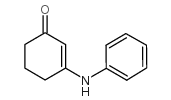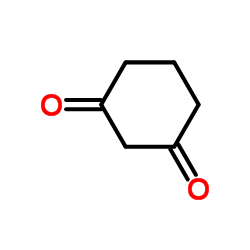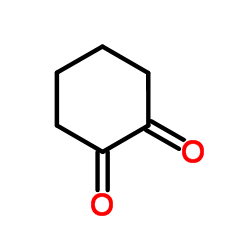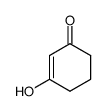24706-50-1
| Name | 3-anilinocyclohex-2-en-1-one |
|---|---|
| Synonyms |
MFCD00082654
3-Anilino-2-cyclohexen-1-one 3-phenylamino-cyclohex-2-enone N-phenyl-3-aminocyclohex-2-enone 3-(Phenylamino)cyclohex-2-enone 3-anilinocyclohex-2-ene-1-one |
| Density | 1.176g/cm3 |
|---|---|
| Boiling Point | 324.9ºC at 760mmHg |
| Melting Point | 178-182 °C |
| Molecular Formula | C12H13NO |
| Molecular Weight | 187.23800 |
| Flash Point | 135.6ºC |
| Exact Mass | 187.10000 |
| PSA | 29.10000 |
| LogP | 2.80840 |
| Vapour Pressure | 0.000238mmHg at 25°C |
| Index of Refraction | 1.629 |
Synonym: Section 2 - COMPOSITION, INFORMATION ON INGREDIENTS
Risk Phrases: None Listed. Section 3 - HAZARDS IDENTIFICATION EMERGENCY OVERVIEW
Not available. Potential Health Effects Eye: May cause eye irritation. Skin: May cause skin irritation. May be harmful if absorbed through the skin. Ingestion: May cause irritation of the digestive tract. May be harmful if swallowed. Inhalation: May cause respiratory tract irritation. May be harmful if inhaled. Chronic: Not available. Section 4 - FIRST AID MEASURES Eyes: Flush eyes with plenty of water for at least 15 minutes, occasionally lifting the upper and lower eyelids. Get medical aid. Skin: Get medical aid. Flush skin with plenty of water for at least 15 minutes while removing contaminated clothing and shoes. Ingestion: Get medical aid. Wash mouth out with water. Inhalation: Remove from exposure and move to fresh air immediately. Notes to Physician: Treat symptomatically and supportively. Section 5 - FIRE FIGHTING MEASURES General Information: As in any fire, wear a self-contained breathing apparatus in pressure-demand, MSHA/NIOSH (approved or equivalent), and full protective gear. Extinguishing Media: Use water spray, dry chemical, carbon dioxide, or chemical foam. Section 6 - ACCIDENTAL RELEASE MEASURES General Information: Use proper personal protective equipment as indicated in Section 8. Spills/Leaks: Vacuum or sweep up material and place into a suitable disposal container. Section 7 - HANDLING and STORAGE Handling: Avoid breathing dust, vapor, mist, or gas. Avoid contact with skin and eyes. Storage: Store in a cool, dry place. Store in a tightly closed container. Section 8 - EXPOSURE CONTROLS, PERSONAL PROTECTION Engineering Controls: Use adequate ventilation to keep airborne concentrations low. Exposure Limits CAS# 24706-50-1: Personal Protective Equipment Eyes: Not available. Skin: Wear appropriate protective gloves to prevent skin exposure. Clothing: Wear appropriate protective clothing to prevent skin exposure. Respirators: Follow the OSHA respirator regulations found in 29 CFR 1910.134 or European Standard EN 149. Use a NIOSH/MSHA or European Standard EN 149 approved respirator if exposure limits are exceeded or if irritation or other symptoms are experienced. Section 9 - PHYSICAL AND CHEMICAL PROPERTIES Physical State: Crystalline powder Color: yellow-green - fine Odor: Not available. pH: Not available. Vapor Pressure: Not available. Viscosity: Not available. Boiling Point: Not available. Freezing/Melting Point: 178 - 182 deg C Autoignition Temperature: Not available. Flash Point: Not available. Explosion Limits, lower: Not available. Explosion Limits, upper: Not available. Decomposition Temperature: Solubility in water: Insoluble. Specific Gravity/Density: Molecular Formula: C12H13NO Molecular Weight: 187.24 Section 10 - STABILITY AND REACTIVITY Chemical Stability: Not available. Conditions to Avoid: Incompatible materials. Incompatibilities with Other Materials: Strong oxidizing agents. Hazardous Decomposition Products: Nitrogen oxides, carbon monoxide, carbon dioxide. Hazardous Polymerization: Has not been reported Section 11 - TOXICOLOGICAL INFORMATION RTECS#: CAS# 24706-50-1: GW7600000 LD50/LC50: Not available. Carcinogenicity: 3-(Phenylamino)cyclohex-2-ene-1-one - Not listed by ACGIH, IARC, or NTP. Other: See actual entry in RTECS for complete information. Section 12 - ECOLOGICAL INFORMATION Section 13 - DISPOSAL CONSIDERATIONS Dispose of in a manner consistent with federal, state, and local regulations. Section 14 - TRANSPORT INFORMATION IATA Not regulated as a hazardous material. IMO Not regulated as a hazardous material. RID/ADR Not regulated as a hazardous material. Section 15 - REGULATORY INFORMATION European/International Regulations European Labeling in Accordance with EC Directives Hazard Symbols: Not available. Risk Phrases: Safety Phrases: S 24/25 Avoid contact with skin and eyes. WGK (Water Danger/Protection) CAS# 24706-50-1: No information available. Canada None of the chemicals in this product are listed on the DSL/NDSL list. CAS# 24706-50-1 is not listed on Canada's Ingredient Disclosure List. US FEDERAL TSCA CAS# 24706-50-1 is not listed on the TSCA inventory. It is for research and development use only. SECTION 16 - ADDITIONAL INFORMATION N/A |
CHEMICAL IDENTIFICATION
HEALTH HAZARD DATAACUTE TOXICITY DATA
|
| Hazard Codes | Xi: Irritant; |
|---|---|
| Risk Phrases | R36/37/38 |
| Safety Phrases | S24/25 |
| RTECS | GW7600000 |
| HS Code | 2922399090 |
|
~96% 
24706-50-1 |
| Literature: Epifano, Francesco; Genovese, Salvatore; Curini, Massimo Tetrahedron Letters, 2007 , vol. 48, # 15 p. 2717 - 2720 |
|
~93% 
24706-50-1 |
| Literature: Merck and Co., Inc. Patent: EP214009 A3, 1989 ; |
|
~89% 
24706-50-1 |
| Literature: Zhuo, Jin-Cong Magnetic Resonance in Chemistry, 1997 , vol. 35, # 5 p. 311 - 322 |
|
~78% 
24706-50-1 |
| Literature: Bergman, Jan; Stensland, Birgitta Journal of Heterocyclic Chemistry, 2014 , vol. 51, # 1 p. 1 - 10 |
| HS Code | 2922399090 |
|---|---|
| Summary | 2922399090 other amino-aldehydes, amino-ketones and amino-quinones, other than those containing more than one kind of oxygen function; salts thereof VAT:17.0% Tax rebate rate:9.0% Supervision conditions:none MFN tariff:6.5% General tariff:30.0% |



